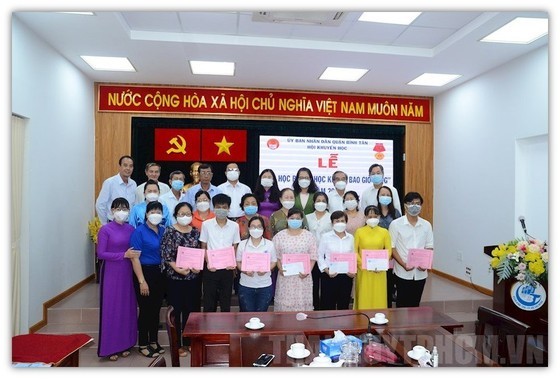 Students in Binh Tan District are given scholarships to encourage them to study well
Students in Binh Tan District are given scholarships to encourage them to study well
The Party Committee in Ho Chi Minh City has just reported on a summary of 15 years of implementing Directive No. 11-CT/TW issued on April 13, 2007, of the Politburo on strengthening the Party's leadership in the study and promotion of education with the aim to build a learning society.
Accordingly, in the period of 2007-2022, the city has well promoted the key role of the study promotion associations in all districts in coordinating with party committees and local authorities to promote people from all walks of life to participate in study activities, and building a learning society.
Simultaneously, the southern metropolis has been mobilizing resources from city dwellers and businesses to increase investment in education, develop the movement to encourage learning and talent, and build a learning society for each family, residential areas, agencies, organizations and schools.
In particular, in the past two years, despite being affected by the Covid-19 epidemic, the activities of study promotion, talent promotion, and building a learning society have been taking place all over the city.
According to statistics from the Department of Education and Training of Ho Chi Minh City, the scale of the education and training industry has grown both in quantity and in quality, contributing to improving people's knowledge and working capacity for officials and employees who are driving force for the city’s socio-economic development.
Specifically, more and more schools were built throughout districts and Thu Duc city. According to the Department’s statistics, additional 2,355 schools from preschool to high school, 1,791 continuing education institutions, and 310 community learning centers were constructed citywide.
At the same time, by the end of 2020, the work of illiteracy eradication and education universalization reached 99.86 percent of people aged 15-60 while all districts have firmly consolidated the results of universalization of primary education at the right age, universalization of lower secondary education and universalization of secondary education.
Currently, the grassroots network for study and talent promotion activities is developed evenly throughout all wards, communes and districts. The municipal Party Committee and the People's Committee regularly direct the city Study Promotion Association to focus on developing a network of study promotion associations in many forms and effective solutions.
Ho Chi Minh City has piloted study promotion associations at Ton Duc Thang University, Nguyen Tat Thanh University and Ho Chi Minh City College of Economics and Technology.
In addition, the city has effectively implemented the project ‘Promoting lifelong learning movement in families, clans and communities until 2020’. Specifically, 21 districts and Thu Duc City have implemented a set of criteria to evaluate and recognize learning models synchronously.
Statistically, more than 1.2 million families were awarded the title of learning family, 840 families with the title of learning family, 2,063 learning units, and 1,897 learning communities.
In particular, Ho Chi Minh City has implemented Circular No. 44/2014 of the Ministry of Education and Training throughout the city by focusing on improving the quality and efficiency of study promotion associations.
Up to now, some 310 community learning centers have been put into operation, of which 95 centers have their own headquarters.
According to Ms. Le Minh Ngoc, former Standing Vice President of Ho Chi Minh City Study Promotion Association, in the 2015-2020 period, VND307 billion was given to students as scholarships and rewards through study support programs across the city.
In general, after 15 years of implementation, party committees, district authorities, and society have been fully aware of the importance of study promotion, talent promotion and building a learning society which resulted in many positive changes.
In the coming time, the city will take heed of study promotion, talent promotion, building a learning society, and simultaneously applying solutions such as boosting investment in the education sector.
























